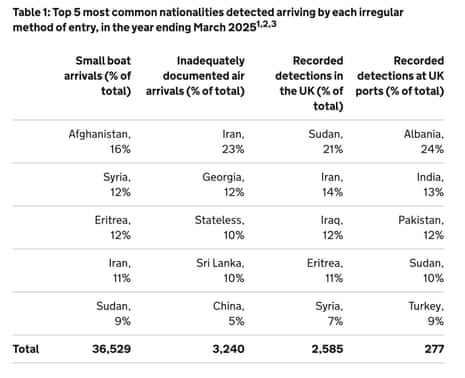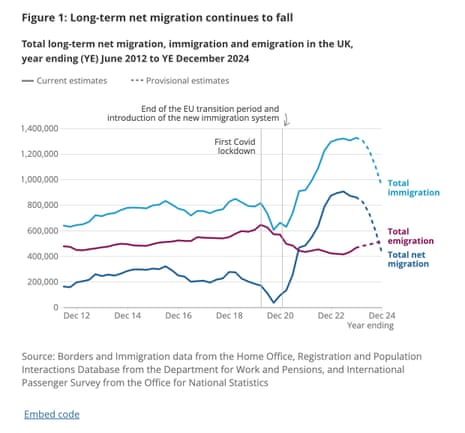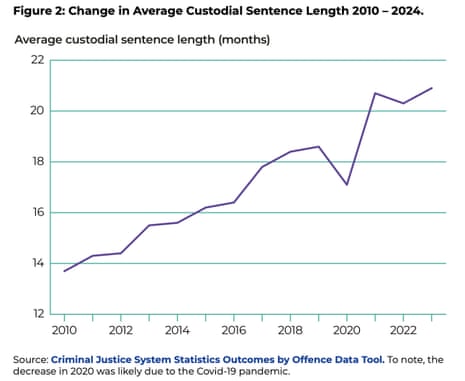Net migration fell by almost 50% in 2024 to 431,000, ONS says
Net migration fell by almost 50% in 2024, compared to the previous year, the Office for National Statistics has said.
In a report out this morning, it says:
Long-term net migration is down by almost 50%. The number of people immigrating minus the number of people emigrating is provisionally estimated to be 431,000 in year ending (YE) December 2024, compared with 860,000 a year earlier.
This change is driven by a decrease in immigration from non-EU+ nationals, where we are seeing reductions in people arriving on work- and study-related visas, and an increase in emigration over the 12 months to December 2024, especially people leaving who originally came on study visas once pandemic travel restrictions to the UK were eased.
The provisional estimate for total long-term immigration for YE December 2024 is 948,000, a decrease of almost a third from the revised YE December 2023 estimate of 1,326,000 and the first time it has been below 1 million since YE March 2022.
The provisional estimate for total long-term emigration for YE December 2024 is 517,000, an increase of around 11% compared with the previous year (466,000). Emigration is now at a similar level to YE June 2017.
Key events Show key events only Please turn on JavaScript to use this feature
Former Tory home secretary James Cleverly says net migration halved because of his visa policies, not Labour's
The Conservatives are taking the credit for the near-50% fall in net migration. They say it is the changes to visa rules that they introduced that brought the numbers down.
This is from Chris Philp, the shadow home secretary.
Net migration has halved - dropped by 430,000 - in 2024 compared to 2023
This is thanks to measures put in place by the last Conservative Government
But it is still far too high and needs to go down further.
That is why we need a binding annual immigration cap, set by Parliament - at much, much lower levels
But when we Conservatives tabled that plan, Labour voted against it last week and again yesterday
The ONS says confirms that changes to visa rules introduced by the last government have been a key factor. (See 9.40am.)
James Cleverly, the home secretary who introduced those visa changes, has posted this on social media.
This drop is because of the visa rule changes that I put in place.
Labour will try to claim credit for these figures but they criticised me at the time, and have failed to fully implement the changes.
How polling shows public were expecting net migration to rise, not fall
British Future, a thinktank that covers race, identity and migration, commissioned polling carried out at the start of May that asked people, among other things, if they expected net migration to go up or down when the next ONS figures came out. Most people thought the headline rate would rise, and only 10% said they expected it to fall.

Sunder Katwala, director of the thinktank, says that, even though this reducation is largely a result of the measures introduced by the last Conservative government, the fact that people will be surprised may give Keir Starmer the chance to be more pragmatic. In a statement he says:
This significant fall in net migration will surprise 90% of the public, who expected numbers to keep going up.
So Keir Starmer is in the unusual position for a PM of having exceeded expectations on immigration – though largely by not cancelling measures introduced by his predecessors.
That gives him an opportunity to take a more pragmatic approach, managing the pressures and keeping the gains of immigration – rather than competing in a political auction over which party can pretend to eliminate it.
Here is the Home Office report on people arriving in the UK irregularly in the year ending in March 2025. Most of these were people arriving on small boats.
This chart shows the most common nationalities of people arriving irregularly.

The Home Office has also released a whole raft of data relating to immigration, asylum, resettlement and returns. The various tables and reports are all here. I will post the highlights shortly.
This is from the Migration Observatory, a migration thinktank based at Oxford University, on the ONS figures. They don’t normally get this excited about anything …
Blimey. Long term net migration down by almost 50% to 431,000. Massive decline - we’ve expected this for a while...
Here is the chart from the ONS report showing what has happened to net migration.

Commenting on the net migration figures (see 9.38am), Mary Gregory, director of population statistics at the Office for National Statistics, said:
Our provisional estimates show net migration has almost halved compared with the previous year, driven by falling numbers of people coming to work and study, particularly student dependants. This follows policy changes brought in restricting visa applications.
There has also been an increase in emigration over the 12 months to December 2024, especially people leaving who originally came on study visas once pandemic travel restrictions to the UK were eased.
Net migration fell by almost 50% in 2024 to 431,000, ONS says
Net migration fell by almost 50% in 2024, compared to the previous year, the Office for National Statistics has said.
In a report out this morning, it says:
Long-term net migration is down by almost 50%. The number of people immigrating minus the number of people emigrating is provisionally estimated to be 431,000 in year ending (YE) December 2024, compared with 860,000 a year earlier.
This change is driven by a decrease in immigration from non-EU+ nationals, where we are seeing reductions in people arriving on work- and study-related visas, and an increase in emigration over the 12 months to December 2024, especially people leaving who originally came on study visas once pandemic travel restrictions to the UK were eased.
The provisional estimate for total long-term immigration for YE December 2024 is 948,000, a decrease of almost a third from the revised YE December 2023 estimate of 1,326,000 and the first time it has been below 1 million since YE March 2022.
The provisional estimate for total long-term emigration for YE December 2024 is 517,000, an increase of around 11% compared with the previous year (466,000). Emigration is now at a similar level to YE June 2017.
High court judge blocks UK from concluding Chagos Islands deal
A high court judge has blocked the UK government from concluding its deal to hand over the Chagos Islands with an injunction granted in the early hours of this morning, Eleni Courea reports.
Tories accuse Labour of ‘decriminalising crimes’ as plans to reduce sentencing announced
Good morning. Shabana Mahmood, the justice secretary, is today announcing plans intended to reduce the amount of time offenders spend in jail. It is not a surprise – the main proposals have been on the table for some time – but it is still a big change from the way governments of all parties have run penal policy over the past few decades. Britain jails more people than most other countries in western Europe and recently sentences have been getting longer.

Mahmood appointed David Gauke, the liberal-minded former Tory justice secretary, to carry out a review of sentencing policy and his final report is out this morning. He has also published a report on history and trends in sentencing. Later Mahmood will give a statement to MPs where she will say which of the recommendations she is accepting. As Rajeev Syal reports in his overnight preview story, the answer is most of them.
Government sources said [Mahmood] is expected to accept the review’s key measures including that well-behaved prisoners should be released on tag after serving a third of their sentences.
She has also accepted that those who have committed serious sexual or violent crimes could be freed to serve their sentence in the community after they have served half of their sentence.
One of Gauke’s suggestions – that the most dangerous offenders should be allowed to apply for parole earlier if they earn “credits” – has been dismissed by sources close to the justice secretary.
And here is Rajeev’s summary of the main points from the report.
Among the main recommendations, Gauke, the former Conservative justice secretary, said the government should:
-Ensure custodial sentences under 12 months are only used in exceptional circumstances.
-Extend suspended sentences to up to three years and encourage greater use of deferred sentences for low-risk offenders.
-Give courts greater flexibility to use fines and ancillary orders like travel, driving and football bans.
-Allow probation officers to adjust the level of supervision based on risk and compliance with licence conditions.
-Expand specialist domestic abuse courts to improve support for victims.
-Expand tagging for all perpetrators of violence against women and girls.
-Improve training for practitioners and the judiciary on violence against women and girls.
-Change the statutory purposes of sentencing so judges and magistrates must consider protecting victims as much as they consider punishment and rehabilitation when passing sentences.
Gauke has called for the need to increase funding and resources for the probation service, including expanding the availability of electronic monitoring equipment like tags, and warned that there will be a “public backlash” if money is not found.
The Conservatives are opposed to the plans. Robert Jenrick, the shadow justice secretary, said:
By scrapping short prison sentences Starmer is effectively decriminalising crimes like burglary, theft and assault. This is a gift to criminals who will be free to offend with impunity.
But Gauke has defended his plans, saying they are needed because otherwise the government will run out of space in prisons, and the criminal justice system will break down. He told the Today programme:
Nobody, I think, wants to see a repeat of [the prisoner early release scheme – an alternative means of dealing with prison overcrowding] because that is rushed, it’s unplanned, it’s unstrategic, and so on, and it’s much better to face up to the realities, recognise where we are with the prison population and set out a plan that is strategic, that is properly prepared and gives due notice to everybody, so that we do not find ourselves in that situation.
Because if you run out of prison places, then really you are putting the whole criminal justice system at risk.
Gauke also said more community sentences could provide better value for money for the taxpayer.
I think there is a point from the perspective of the taxpayer that can be missed here. Prisons are expensive. They cost £54,000-a-year for a prison place. That money can be spent very effectively in the community, both punishing offenders and helping with rehabilitation.
Here is the agenda for the day.
9.30am: Lisa Nandy, the culture secretary, takes questions in the Commons.
9.30am: The Office for National Statistics publishes immigration figures for the year ending December 2024. The Home Office is also publishing its own quarterly figures on asylum seekers, visas and resettlement.
10am: Kent county council meets for the first time since it came under Reform UK control.
10am: Matt Hancock, the former health secretary, gives evidence to the Covid inquiry as part of its test, trace and isolate module.
10.30am: Lucy Powell, the leader of the Commons, takes questions on future Commons business.
11.30am: Downing Street holds a lobby briefing.
Around 11.30am: Shabana Mahmood, the justice secretary, is expected to make a Commons statement about the Gauke review of sentencing.
Noon: John Swinney, Scotland’s first minister, takes questions from MSPs.
Here is the agenda for the day.
If you want to contact me, please post a message below the line when comments are open (normally between 10am and 3pm at the moment), or message me on social media. I can’t read all the messages BTL, but if you put “Andrew” in a message aimed at me, I am more likely to see it because I search for posts containing that word.
If you want to flag something up urgently, it is best to use social media. You can reach me on Bluesky at @andrewsparrowgdn.bsky.social. The Guardian has given up posting from its official accounts on X but individual Guardian journalists are there, I still have my account, and if you message me there at @AndrewSparrow, I will see it and respond if necessary.
I find it very helpful when readers point out mistakes, even minor typos. No error is too small to correct. And I find your questions very interesting too. I can’t promise to reply to them all, but I will try to reply to as many as I can, either BTL or sometimes in the blog.

 3 months ago
132
3 months ago
132

















































